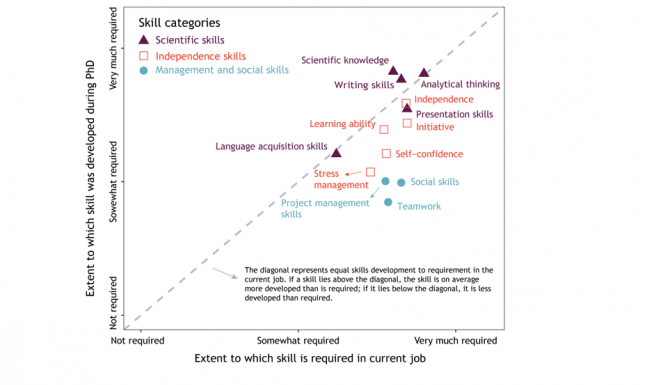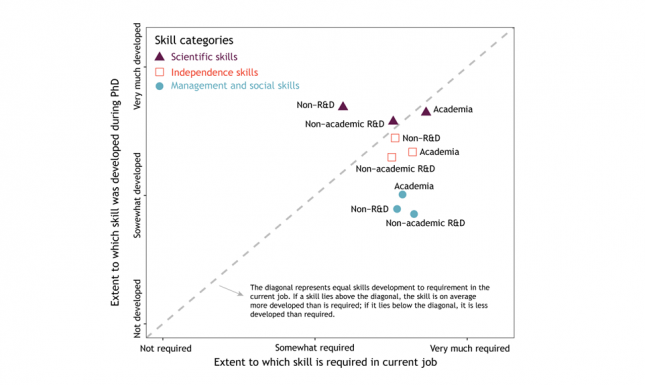Skill gaps of PhD graduates
Based on our research, we discuss which gaps exist between the skills PhD graduates developed during their PhD and the skills that are required and valued in their current job. Which relevant skills do graduates bring to future jobs and which skills were underdeveloped during their PhD trajectory?
Increasing numbers of doctoral graduates work outside academia. However, a PhD degree has been often regarded as the gateway to an academic career, which is also considered as the ‘default’ career for PhD graduates. In the same vein, careers outside academia are seen as ‘alternative careers’. Still, in many countries, more PhD graduates work outside academia than within academia. Therefore, you could argue that ‘alternative careers’ should not be called as such and that academic careers should be considered the alternative career option instead.
As seen below, academia is still often seen as the default career path for PhD graduates by many academics and by PhD candidates themselves. This leads to PhD candidates being insufficiently prepared for a job search outside academia after obtaining their doctoral degree. This issue is recognized by various organizations within the university sector, for example by the League of European Research Universities (LERU).
The schism between academia being seen as the default career for PhD graduates and the reality that many PhD graduates will work outside academia raises the question to what extent PhD trajectories offer the skills that are required for jobs outside academia. To study this, we surveyed 2,193 recently graduated PhDs from Dutch universities (who finished their PhD trajectories two to six years ago). The results of this study can be found in this pre-print.
Skill gaps: largest gap in management and social skills
We asked recently graduated PhD candidates to which extent they developed certain skills during their PhD trajectories and to which extent they need these in their current jobs. From this, we estimated the gaps there are between the acquired skills during one’s PhD and the skills in the current job. The figure below plots thirteen skills in terms of skill’s development during one’s doctoral education (averages on Y-axis) and requirements in one’s current job (averages on X-axis). A factor analysis indicated that skills could be clustered in three categories: scientific skills, independence skills, and management and social skills.

Looking at the Y-axis, it can be seen that PhD graduates developed scientific knowledge, analytical thinking, and writing skills to the largest extent. Least developed skills were teamwork, social skills, and project management skills.
The further away skills are located from the diagonal, the larger the skill gap becomes. A positive skill gap applies to skills above the diagonal, which means that those skills were developed to a larger extent than they are actually required in the current job. Below the diagonal are the skills that were developed to a smaller extent than they are required in the current job. The skill gap is rather small in scientific knowledge, analytical thinking, independence, learning ability, presentation skills, writing skills, and language acquisition skills. The largest skill gaps are found in teamwork, social skills, and project management skills. These were all underdeveloped compared to the skills needed in the current job.
Skill gaps by sector: greatest outside academia but management and social skills also underdeveloped for academic jobs
Next, we investigated whether skill gaps differ by sector of employment, as one may expect the different sectors where PhD graduates work to have different skill requirements. A similar plot was made for the three skill categories; this time by sector of employment: academia, non-academic R&D, and non-R&D. A technical explanation of the grouping of PhD graduates into the sectors can be found in an earlier paper (the link will take you to the relevant section in the paper).

PhD graduates reported management and social skills to be particularly underdeveloped compared to the requirements of their current jobs. A comparison between the sectors of employment shows that this skill gap is larger in non-academic R&D than in academia. Still, what is interesting here is that the PhD trajectory also insufficiently prepared PhD graduates for working in academia in this respect. Therefore, (project) management and social skills remain insufficiently developed during PhDs.
Independence skills were less underdeveloped in the non-R&D sector compared to both the non-academic R&D sector and academia sector. Finally, the largest ‘overdevelopment’ of skills concerned scientific skills development for PhD graduates working in non-R&D. This makes sense, as you would expect PhD graduates who are not involved in research or development in their current job to need their developed scientific skills less.
What does this mean for PhD trajectories?
Our findings corroborate other studies that show that skills such as teamwork and project management are vital in many jobs, both inside and outside academia. However, such skills are not sufficiently developed during doctoral education in the Netherlands.
To improve employability of PhDs, PhD programs in the Netherlands should more explicitly highlight the multitude of skills possibly developed during PhDs and enable a broader career development. Another recommendation is to integrate a broader societal focus into PhD programs from the earliest stages; for example by organizing visits to companies working in relevant fields or by offering joint research projects in which PhD students work together with business and industry.
Courses on transferable skills, for example the ones offered by Leiden University itself or those offered at other universities, may also help. Current PhD candidates may also enlist the help of professional career counselling, such as the counselling offered by their own universities, or other professionals tailoring their services to PhD candidates. In the Netherlands, these include (but are not limited to) Claartje van Sijl, Samula Mescher, Louter Promoveren, PhD Power and CDr Coaching*.
International inspiration can be found on the blogs and Twitter profiles of From PhD to Life, Beyond the Professoriate, and Exploring Research Careers.
Our study shows that a skill gap exists between doctoral education and the labour market in the Netherlands. While this gap is small for PhD graduates working in academia, it is more prominent for PhD graduates working outside academia. As this is the sector in which most PhD graduates will eventually work, there is a need to better align the training during PhD trajectories with the demands from the labour market.
* The authors are not affiliated with any of the services mentioned in the blog post.





0 Comments
Add a comment